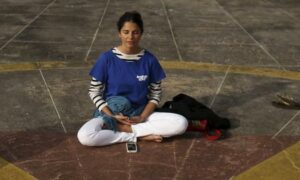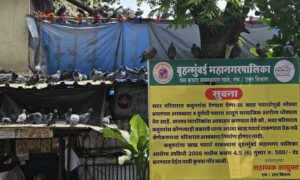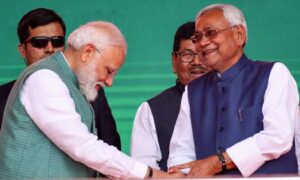This is the 150th birth anniversary year of the great French composer, pianist and conductor Maurice Ravel (1875-1937). His music is being celebrated all over the world. The Symphony Orchestra of India featured his best-known large orchestral work Boléro on the weekend in Mumbai under the baton of Andrew Litton.
The BBC Proms 2025 season also highlights Ravel’s music. On July 20, Nicholas McCarthy made his Prom debut performing Ravel’s Piano Concerto for the Left Hand with the Bournemouth Symphony Orchestra with Mark Wigglesworth conducting.
In Hindi, “baayen haath ka khel” is an idiom used to describe something ridiculously easy. This is certainly not applicable when it comes to piano compositions for the left hand.
But why would composers even bother with such a repertoire in the first place? Keith Porter-Snell, pianist, piano teacher, and writer of educational music for piano students, lists four reasons: technical, injury or disability, virtuosic display and compositional challenge.
Ravel’s Piano Concerto for the Left Hand was created for all four of the above considerations. Concert pianist Paul Wittgenstein (1887-1961), older brother of the philosopher Ludwig Wittgenstein, was shot in the right elbow during the First World War, necessitating amputation of that arm.
Among the many well-known composers (Benjamin Britten, Paul Hindemith, Erich Korngold, Sergei Prokofiev, Richard Strauss) he commissioned to then write challenging, virtuosic, rigorous works for the left hand, Ravel’s work (completed between 1929 and 1930) became more famous than the rest.
In Magician of Sound: Ravel and the Aesthetics of Illusion (2021), Ravel scholar Jessie Fillerup spends much time analysing the work: “Melodies appear in the thumb of the left hand as the fingers play arpeggiations beneath it, amplified by the damper pedal, and large chordal leaps aid the impression of two hands playing in discrete registers”, a form of “compositional legerdemain” (the skillful use of one’s hands, or in this case, hand, when performing conjuring tricks).
Ravel’s pupil, friend and critic Alexis Roland-Manuel (1891-1966) used the term “la main enchantée”, implying a “virtual” right hand.
In the McCarthy Prom debut concert, one can literally see Ravel’s clever use of the orchestral palette when the piano seamlessly rides the crest of an ascending harp glissando wave, just one example of the “magician of sound” at work.
After a clamorous ovation from the audience, McCarthy played Alexander Scriabin’s technical tour de force yet extremely contemplative Nocturne for the Left Hand, Opus 9, written when, aged 18, the composer temporarily lost the use of his right hand due to tendonitis stemming from over-practice.
Nicholas McCarthy is a tour de force himself. Born without his right hand, his first exposure to classical music came at the age of 14, when he heard a friend perform Beethoven’s piano sonata number 21, opus 53, nicknamed “Waldstein”. In that moment, as he tells it in one interview, he just knew that he wanted to be a concert pianist, “completely ignoring the fact that I only had one hand”.
McCarthy tried to arrange an audition with the headmistress of the “very good music school” his friend went to. “That was really the first time a door was firmly slammed in my face,” he recalled. “Purely due to my disability she said she didn’t have time to see me.”
She asked him how he would be able to play scales with two hands, when he only had one, and put down the phone. “That was the first wall, the first hurdle that I hit,” he said.
He refused to be discouraged by the rejection. At 17, McCarthy was accepted into the junior department at London’s Guildhall School of Music and Drama, on the proviso that he focus on repertoire written specifically for the left hand. It was here he discovered that there were 3,000 works in this repertoire, with close to 30 piano concertos. He won the annual piano prize.
McCarthy then enrolled at the Royal College of Music London. In 2012, he became the first one-handed graduate in the institution’s 130-year history.
That year was a watershed year for McCarthy, as he was also chosen that September to perform with the Paraorchestra (an ensemble of musicians with disabilities founded by conductor Charles Hazlewood) alongside Coldplay during the closing ceremony of the 2012 Summer Paralympics in London. The event was watched by 86,00 people in the stadium and millions worldwide, which hugely helped his career.
McCarthy considers Paul Wittgenstein his hero for clearing the path for him by commissioning so many concertos and other significant repertoire from the “crême de la crême” of the composers of his time.
“Without him, I wouldn’t have had access to the titans of the 20th century. So I’m eternally in his debt,” he told BBC Radio 3 presenter Petroc Trelawny in the interval after his Proms performance.
He quite literally also follows in Wittgenstein’s footsteps: although Ravel’s Piano Concerto for the Left Hand as been performed several times at the Proms by two-handed pianists (I was present at the performance in 2002 by Louis Lortie and in 2007 by Roger Muraro), McCarthy is only the second one-handed pianist after Wittgenstein himself to have played it.
Wittgenstein performed it in 1932 shortly after its commission, at the Queen’s Hall (which was bombed in the Second World war), and in 1951 at the Royal Albert Hall, the same venue as McCarthy did this year. That was Proms history in the making.
McCarthy has also begun commissioning new works for the left-hand-alone repertoire. “I feel a sense of responsibility, because, without [Wittgenstein], I wouldn’t have had the career I have today,” he told Trelawny. “But moving forward, I’m hoping that maybe next century someone might say, ‘Thank god Nicholas McCarthy commissioned this wonderful concerto’ that they’re playing at the Proms.”
He is passionate about wider representation right across classical music. “I started [playing piano] at 14, incredibly late for a pianist,” he said. “I always think to myself that if I had seen someone else with one arm like me, perhaps I would have started younger.”
McCarthy makes an important point that is valid even more widely. It underscores the importance of concerts at the highest level to feature regularly on our event calendar. There’s no telling which young imagination will get so fired up by which role model and when.
However, mediocre concerts can have the reverse effect, creating a distorted impression about the world of classical music if young (and old) listeners don’t have a realistic benchmark to begin with.
Outside of his concert career, McCarthy is in demand around the world as a motivational speaker. He has endured much negativity and underestimation in his life journey. He “pro-tip”, as he put it at a 2023 TEDx talk, is to “use that negativity and that anger to drive your best self forward”.
His motto? “Anything is possible if you are determined and focused on your goal.”
This article first appeared in The Navhind Times, Goa. It has been reproduced with the permission of the writer.
This article first appeared on Scroll.in
📰 Crime Today News is proudly sponsored by DRYFRUIT & CO – A Brand by eFabby Global LLC
Design & Developed by Yes Mom Hosting






